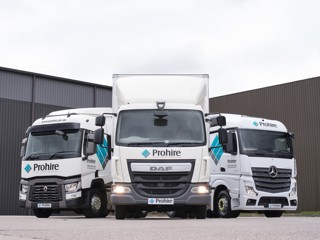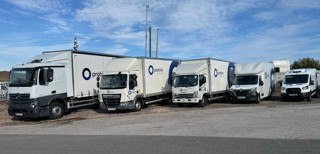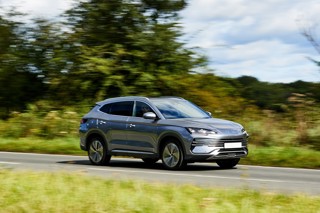
Lengthening delivery times caused by the semiconductor and other component supply issues dominated discussions at the Fleet News roundtable sponsored by Holman, held at Huntingdon racecourse in May.
With a knock-on impact on parts shortages resulting in longer maintenance downtime, shrinking discounts and a lack of rental vehicles, fleets described the situation as “a perfect storm”, pointing to the added woes of rising fuel and energy prices.
Fleet News: How are vehicle delays affecting your business?
Lorna McAtear, National Grid: Discounts are disappearing, prices keep increasing, supply delays mean constant requotes and vehicles are being pulled. When we are requoting, is that down to the manufacturer or the leasing company, because it’s the driver receiving the message to say their car has been cancelled. What was a five-minute automated process (quotes/orders) is now manual, taking much longer.
Debbie Floyde, Bauer Media: It’s a painful situation at the moment, a perfect storm with vehicle supply issues and funding complexities, including salary sacrifice which we are looking into. We have so many more touchpoints with the driver, keeping them informed about all the changes.
John Hole, PHS: Having a single source supply strategy has helped us to negotiate price guarantees on our orders, but we are still seeing cancellations. There is also a knock-on in terms of cost of repairs as vehicles get older, which is made worse by the delays on parts supply.

Lengthening delivery times caused by the semiconductor and other component supply issues dominated discussions at the Fleet News roundtable sponsored by Holman, held at Huntingdon racecourse in May.
With a knock-on impact on parts shortages resulting in longer maintenance downtime, shrinking discounts and a lack of rental vehicles, fleets described the situation as “a perfect storm”, pointing to the added woes of rising fuel and energy prices.
Fleet News: How are vehicle delays affecting your business?
Lorna McAtear, National Grid: Discounts are disappearing, prices keep increasing, supply delays mean constant requotes and vehicles are being pulled. When we are requoting, is that down to the manufacturer or the leasing company, because it’s the driver receiving the message to say their car has been cancelled. What was a five-minute automated process (quotes/orders) is now manual, taking much longer.
Debbie Floyde, Bauer Media: It’s a painful situation at the moment, a perfect storm with vehicle supply issues and funding complexities, including salary sacrifice which we are looking into. We have so many more touchpoints with the driver, keeping them informed about all the changes.
John Hole, PHS: Having a single source supply strategy has helped us to negotiate price guarantees on our orders, but we are still seeing cancellations. There is also a knock-on in terms of cost of repairs as vehicles get older, which is made worse by the delays on parts supply.
Sarah Sharples, Bauer Media: Drivers don’t understand; they think we are being awkward.
LMcA: I’ve done so many presentations on the supply chain issues we have faced over the past three years, from WLTP to factory closures to Covid to the war in Ukraine. When you point it all out, we’ve had drivers apologise for the way they had behaved! But the awareness only happened because I stood in meetings or on Teams and explained it all.
DF: One of the issues is some drivers are now in five-year-old combustion engine cars and they want to change to tax-efficient electric vehicles (EVs). We have, in some cases, encouraged them to take cash.
JH: With the rising fuel bills, there are also issues on fuel reimbursement. We have increased our rates; we have to justify it, but the Government AFR (advisory fuel rate) is the minimum we have to pay, and our finance director does the justification. We have increased it by 2p per mile across the rates.
LMcA: We have a problem with the AER (advisory electric rate) because we can’t guarantee receipts on the public charging network which causes problems on reimbursements. That makes it hard to pay actual use. We are thinking of saying that the average EV does 150 miles (per week) and everything up to that will be AER; everything above will be at a higher rate. But it’s still something we are brainstorming.
FN: The supply issues are also causing parts delays, resulting in longer repair times, as well as a shortage of rental vehicles. How are you coping with all these additional issues?
LMcA: I’m keeping vehicles when drivers leave, and they are going out as replacements – it’s almost an instant reallocation. We also do not cancel orders, even if someone leaves, because we need the vehicle on fleet.
However, we are getting around 12 new vehicle orders per week cancelled because of the pricing changes or models being dropped.
JH: We are seeing the time to repair rising and that is increasing our rental charges – if we can get one. It is impossible to get a car for a day. In March, we had an 80% turndown rate and we use a broker. We are taking our best end-of-contract vans and refurbishing and putting them back into the fleet.
DF: We have acquired vehicles that were due to be defleeted and holding on to them to keep people mobile.
Jenny Maidment, RSA: We are having to consider things that we would normally never do.
LMcA: We are getting phone calls from manufacturers who say ‘we now have 50 vehicles, do you want them?’ because some companies have pulled out of deals. But it’s very much ‘take it or leave it’ on prices.
Rory McKinnon, Holman: It will take years of business correction to sort out the rental market. They have never had to manage vehicles before because they were sold ahead of 12 months.
LMcA: They used to get high discount deals and then sold them before the first year; now they are buying used.
We tell our staff to check their rental vehicle for tyres, damage etc. and take photos. But we still tell them to keep it.
DF: I can’t imagine the fleet industry going back to where it was a few years ago in terms of cars and funding. Our benchmark entitlement on mileage is less than ever.
FN: What funding models do you deploy and why?
JH: We are single source and single lease supply. We have looked at other models and in a previous role we ran operating lease where we bought and sold back, but contract works for us. We tender every five years.
JM: Our cars are on personal leases with the driver, but we are now switching to a contract purchase company car scheme which is easier for the driver to understand. It will open up to all manufacturers which has resulted in happy drivers.
LMcA: We have a panel of three funders that can tender for each vehicle and they are policed by a fleet management company. Every order goes into a bid – a minimum of two have to bid – which is the most cost-effective solution for us. The cheapest price wins. Everything is on three years, and we offer an uplift if they pick an EV because we save on the NIC (National Insurance Contributions). We put the money at the front end to get the cars into the lower grades. We also allow staff to increase their personal allowance if they pick an EV, because they are saving so much on the tax. Also, with the vehicle shortages, we can always reallocate an EV.
JH: We did discount by 15% in the first year for a reallocation and 10% in the second year, but we don’t need to now. We do profit share and pooled mileage.
RMcK: It’s a sad situation for contract hire companies that people feel they have to multi-bid; they should be able to trust the quote.
DF: We are looking at salary sacrifice which was going to be with our company car provider, but we will be going separate.
Volume used to speak a lot, but it doesn’t any more so we don’t have to stay with one.
RMcK: In 2022, you have to have a salary sacrifice scheme; now is the moment. There is nothing as beneficial from a tax perspective.
LMcA: From a lot of finance and HR directors, salary sacrifice is the cash equivalent.
FN: Are you extending contracts?
LMcA: We are sticking with informal extensions, but we are considering putting EVs onto four years. Extensions have been offset by less mileage, so we aren’t seeing an increase in maintenance costs. With EVs, we don’t have the mechanical issues any more, it’s mainly software. So, extending them isn’t as much of a problem.
JH: LCVs are becoming really unreliable, though. We keep them for five years and we have some now at seven and eight years after taking an informal lease holiday during Covid. It’s the stop-start mileage that causes issues with the life-expired items such as clutches and gearboxes. We will be putting EVs on a seven-year term to get the return, but we will have to refurbish the interiors after five-to-six years. We also bought 500 key fobs off Vauxhall at cost and hold them centrally as replacements.
DF: We did some formal extensions on rolling contracts. We pay finance up front on a three-year lease and pay monthly maintenance but it’s my risk, so we take the overs/unders. This saves interest.
RMcK: This year will be the most profitable ever for leasing companies with the extensions and residual values.
There is always value in the asset or in running it on, but unbundling offers has benefits for fleets.
LMcA: If you own your vans, you have an advantage because at the end of the life you can decide whether to sell it or break it to solve the parts shortages.
JH: We have a yard full of bodies and we buy a lot of salvage back to break for parts. We’re also seeing the skill sets at the dealership going down. They are too focused on the diagnostics machine giving them the answer.
Login to continue reading.
This article is premium content. To view, please register for free or sign in to read it.





















Login to comment
Comments
No comments have been made yet.